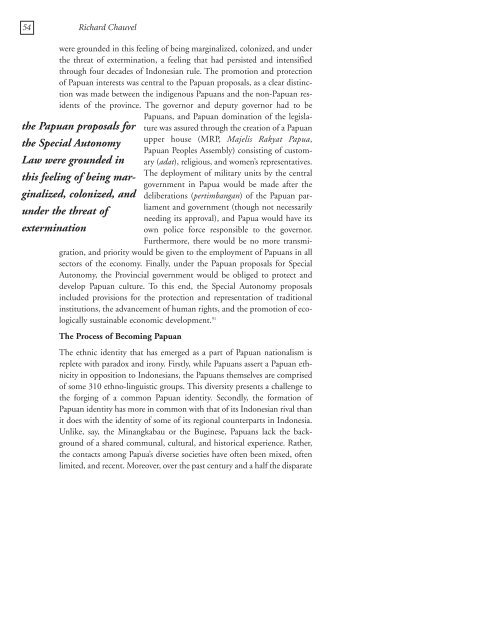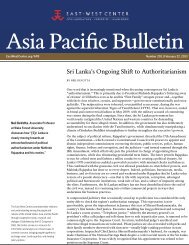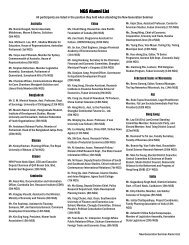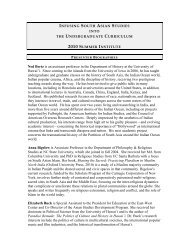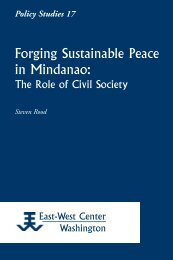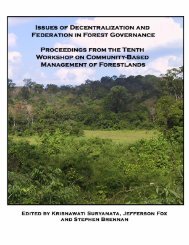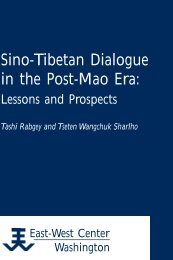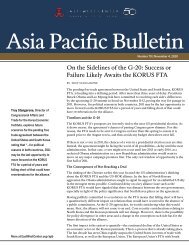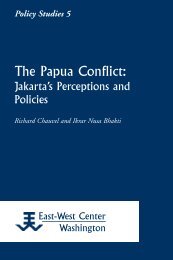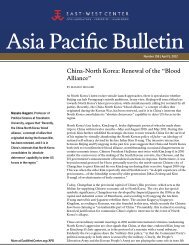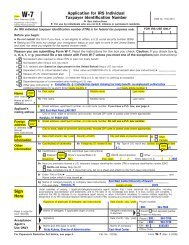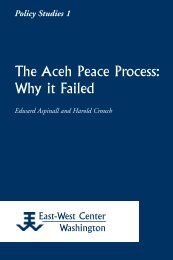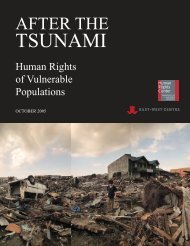Constructing Papuan Nationalism: History, Ethnicity ... - ScholarSpace
Constructing Papuan Nationalism: History, Ethnicity ... - ScholarSpace
Constructing Papuan Nationalism: History, Ethnicity ... - ScholarSpace
- No tags were found...
You also want an ePaper? Increase the reach of your titles
YUMPU automatically turns print PDFs into web optimized ePapers that Google loves.
54 Richard Chauvelwere grounded in this feeling of being marginalized, colonized, and underthe threat of extermination, a feeling that had persisted and intensifiedthrough four decades of Indonesian rule. The promotion and protectionof <strong>Papuan</strong> interests was central to the <strong>Papuan</strong> proposals, as a clear distinctionwas made between the indigenous <strong>Papuan</strong>s and the non-<strong>Papuan</strong> residentsof the province. The governor and deputy governor had to be<strong>Papuan</strong>s, and <strong>Papuan</strong> domination of the legislaturewas assured through the creation of a <strong>Papuan</strong>upper house (MRP, Majelis Rakyat Papua,<strong>Papuan</strong> Peoples Assembly) consisting of customary(adat), religious, and women’s representatives.The deployment of military units by the centralgovernment in Papua would be made after thedeliberations (pertimbangan) of the <strong>Papuan</strong> parliamentand government (though not necessarilyneeding its approval), and Papua would have itsown police force responsible to the governor.Furthermore, there would be no more transmigration,and priority would be given to the employment of <strong>Papuan</strong>s in allsectors of the economy. Finally, under the <strong>Papuan</strong> proposals for SpecialAutonomy, the Provincial government would be obliged to protect anddevelop <strong>Papuan</strong> culture. To this end, the Special Autonomy proposalsincluded provisions for the protection and representation of traditionalinstitutions, the advancement of human rights, and the promotion of ecologicallysustainable economic development. 91the <strong>Papuan</strong> proposals forthe Special AutonomyLaw were grounded inthis feeling of being marginalized,colonized, andunder the threat ofexterminationThe Process of Becoming <strong>Papuan</strong>The ethnic identity that has emerged as a part of <strong>Papuan</strong> nationalism isreplete with paradox and irony. Firstly, while <strong>Papuan</strong>s assert a <strong>Papuan</strong> ethnicityin opposition to Indonesians, the <strong>Papuan</strong>s themselves are comprisedof some 310 ethno-linguistic groups. This diversity presents a challenge tothe forging of a common <strong>Papuan</strong> identity. Secondly, the formation of<strong>Papuan</strong> identity has more in common with that of its Indonesian rival thanit does with the identity of some of its regional counterparts in Indonesia.Unlike, say, the Minangkabau or the Buginese, <strong>Papuan</strong>s lack the backgroundof a shared communal, cultural, and historical experience. Rather,the contacts among Papua’s diverse societies have often been mixed, oftenlimited, and recent. Moreover, over the past century and a half the disparate


